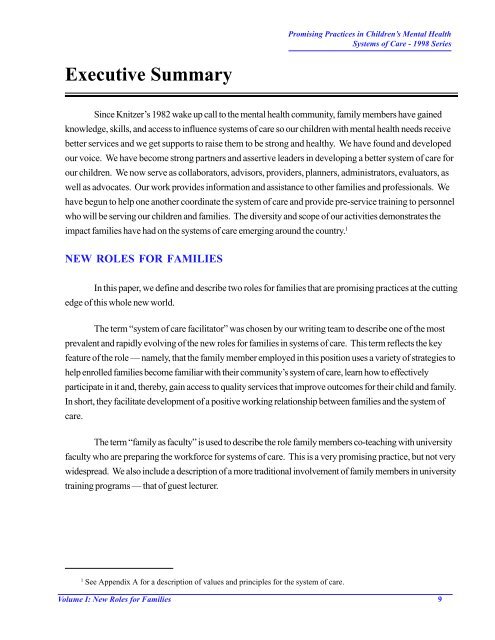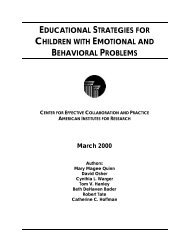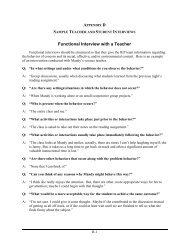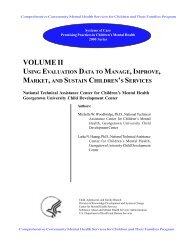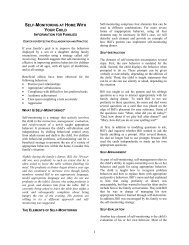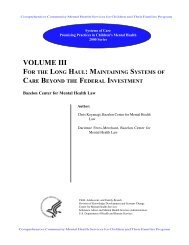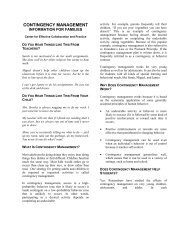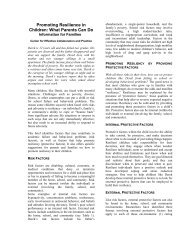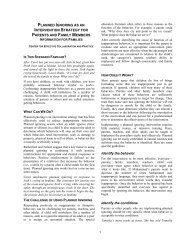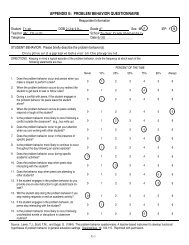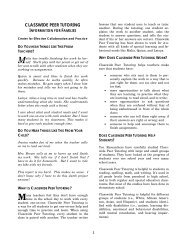VOL 1 - Center for Effective Collaboration and Practice - American ...
VOL 1 - Center for Effective Collaboration and Practice - American ...
VOL 1 - Center for Effective Collaboration and Practice - American ...
You also want an ePaper? Increase the reach of your titles
YUMPU automatically turns print PDFs into web optimized ePapers that Google loves.
Executive Summary<br />
Promising <strong>Practice</strong>s in Children’s Mental Health<br />
Systems of Care - 1998 Series<br />
Since Knitzer’s 1982 wake up call to the mental health community, family members have gained<br />
knowledge, skills, <strong>and</strong> access to influence systems of care so our children with mental health needs receive<br />
better services <strong>and</strong> we get supports to raise them to be strong <strong>and</strong> healthy. We have found <strong>and</strong> developed<br />
our voice. We have become strong partners <strong>and</strong> assertive leaders in developing a better system of care <strong>for</strong><br />
our children. We now serve as collaborators, advisors, providers, planners, administrators, evaluators, as<br />
well as advocates. Our work provides in<strong>for</strong>mation <strong>and</strong> assistance to other families <strong>and</strong> professionals. We<br />
have begun to help one another coordinate the system of care <strong>and</strong> provide pre-service training to personnel<br />
who will be serving our children <strong>and</strong> families. The diversity <strong>and</strong> scope of our activities demonstrates the<br />
impact families have had on the systems of care emerging around the country. 1<br />
NEW ROLES FOR FAMILIES<br />
In this paper, we define <strong>and</strong> describe two roles <strong>for</strong> families that are promising practices at the cutting<br />
edge of this whole new world.<br />
The term “system of care facilitator” was chosen by our writing team to describe one of the most<br />
prevalent <strong>and</strong> rapidly evolving of the new roles <strong>for</strong> families in systems of care. This term reflects the key<br />
feature of the role — namely, that the family member employed in this position uses a variety of strategies to<br />
help enrolled families become familiar with their community’s system of care, learn how to effectively<br />
participate in it <strong>and</strong>, thereby, gain access to quality services that improve outcomes <strong>for</strong> their child <strong>and</strong> family.<br />
In short, they facilitate development of a positive working relationship between families <strong>and</strong> the system of<br />
care.<br />
The term “family as faculty” is used to describe the role family members co-teaching with university<br />
faculty who are preparing the work<strong>for</strong>ce <strong>for</strong> systems of care. This is a very promising practice, but not very<br />
widespread. We also include a description of a more traditional involvement of family members in university<br />
training programs — that of guest lecturer.<br />
1 See Appendix A <strong>for</strong> a description of values <strong>and</strong> principles <strong>for</strong> the system of care.<br />
Volume I: New Roles <strong>for</strong> Families 9


